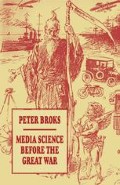Abstract
There is a very curious feature about the portrayal of scientists in these magazines. The most fulsome praise is to be found in the more religious publications. What then of any supposed conflict between science and religion? In Good Words Kelvin was, as we have seen, noble, pure and reverent, Aitkin courageous and indefatigable, but elsewhere we can also read of the labours of Lister, the philanthropy of Perkin, the fearlessness and resource of Ramsay, the perseverance and determination of Edison, and the love of truth and patience of Newton.1 Even Darwin, of all people, is admired for having ‘sound judgement, unwearied industry, absence of prejudice, a passionate love of truth, and withal abounding charity, all different aspects of real religion’.2 Courage, patience, modesty, selflessness, the moral efficacy of scientific practice made scientists ideal material for that genre of moralistic literature that had been so common earlier in the nineteenth century.
Access this chapter
Tax calculation will be finalised at checkout
Purchases are for personal use only
Preview
Unable to display preview. Download preview PDF.
Notes
Mona Caird, ‘Scientific popery’, Clarion, 29 December 1894, p. 6. Caird was calling for scepticism over the claims for a new anti-toxin treatment for diphtheria. The rejection of a new scientific priesthood and the abandonment of the Christian faith left many like Sidgwick, Myers and Butler ‘between science and religion’. See Frank M. Turner, Between Science and Religion: The reaction to scientific naturalism in late Victorian England (London, 1974).
Richard D. French, Anti-vivisection and Medical Science in Victorian Society (London, 1975), p. 230.
Owen Chadwick, The Victorian Church (London, 1966), pt II, p. 35.
Frank M. Turner, ‘Public science in Britain, 1880–1919’, Isis, 71 (1980), pp. 589–608. On the ‘conflict’ of science and religion, see also
Frank M. Turner, Between Science and Religion: The reaction to scientific naturalism in late Victorian England (London, 1974), and ‘The Victorian conflict between science and religion: a professional dimension’, Isis, 69 (1978), pp. 356–76.
Susan Budd, ‘The loss of faith: reasons for unbelief among members of the secular movement in England, 1850–1950’, Past and Present, 36 (1967), p. 125.
See also Susan Budd, Varieties of Unbelief: Atheists and agnostics in English society, 1850–1960 (London, 1977).
F. le Gros Clark, Paley’s Natural Theology: Revised to harmonize with modern science (London, 1885).
John Hedley Brooke, ‘The natural theology of the geologists: some theological strata’, in L.J. Jordanova and Roy Porter (eds), Images of the Earth: Essays in the history of the environmental sciences (Chalfont St Giles, 1979), pp. 39–64.
Henry Drummond, Natural Law in the Spiritual World (London, 1883).
A.M. Thompson, preface to Robert Blatchford, My Eighty Years (London, 1931), p. ix.
John Kent, From Darwin to Blatchford: The role of Darwinism in Christian apologetics, 1875–1910 (London, 1966).
Blatchford’s position has much in common with German evolutionary socialism. See Alfred Kelly, The Descent of Darwin: The popularisation of Darwinism in Germany, 1860–1914 (Carolina, 1981), and
Hugh MacLeod, ‘Religion in the British and German labour movements, c. 1890–1914’, Bulletin of the Society for the Study of Labour History, vol. 51 (1986), pt 1, pp. 25–35.
John Laurent, ‘Science, society and politics in late-nineteenth-century England: a further look at mechanics’ institutes’, Social Studies of Science, vol. 14 (1984), p. 598.
See Logie Barrow, Independent Spirits: Spiritualism and English plebeian culture, 1850–1910 (London, 1986), and ‘The socialism of Robert Blatchford and the “Clarion”’ (Unpublished Ph.D. thesis, University of London, 1975).
Author information
Authors and Affiliations
Copyright information
© 1996 Peter Broks
About this chapter
Cite this chapter
Broks, P. (1996). Science and Religion. In: Media Science before the Great War. Palgrave Macmillan, London. https://doi.org/10.1007/978-1-349-25043-1_5
Download citation
DOI: https://doi.org/10.1007/978-1-349-25043-1_5
Publisher Name: Palgrave Macmillan, London
Print ISBN: 978-1-349-25045-5
Online ISBN: 978-1-349-25043-1
eBook Packages: Palgrave History CollectionHistory (R0)

